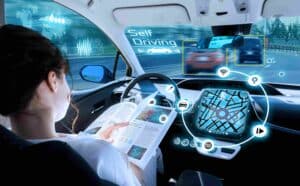
A few decades ago, self-driving cars were seen in futuristic movies and shows. Today, though, they are on the roads. Companies like Uber are even testing fully autonomous self-driving technology, and Tesla has semi-autonomous vehicles available for purchase, with many other manufacturers following in these company’s footsteps.
The law related to self-driving vehicles is still being developed. Unfortunately, many laws will only come into play if someone is injured in an accident with an autonomous vehicle. If you are in this situation, it is essential to enlist the services of an experienced Connecticut car accident attorney.
The Legal Landscape of Self-Driving Cars in Connecticut
Self-driving cars are legal in all states. However, several states, including Connecticut, have laws and rules (beyond the federal laws) related to the testing and use of these vehicles.
In Connecticut, the Department of Motor Vehicles regulates all vehicle operations, including self-driving cars.
Some of the things to know include:
- An operator must be in the driver’s seat of the vehicle.
- The operator must always monitor the operation of the vehicle.
- The operator must be able to take control of the vehicle’s operation at any time.
- The operator has training and a full understanding of how the vehicle works.
- The operator has an operator’s license.
Determining Fault in an Accident with a Self-Driving Car
When an accident involves a self-driving car, determining fault can be more complicated than in traditional accidents. Several parties could potentially be at fault, including:
The Self-Driving Car’s Operator
Even in a self-driving car, a licensed human operator is usually required to be in the vehicle, as mentioned above. This individual is responsible for overseeing the car’s operations and intervening if the autonomous system fails or makes an error. If an accident occurs, the operator can be held partially or wholly at fault for failing to prevent the mishap.
The Manufacturer
Manufacturers of self-driving cars bear a significant responsibility when it comes to vehicle safety. These companies are in charge of creating and maintaining the software and hardware that control the vehicle.
If an accident is traced back to a system failure or design flaw, the manufacturer could be held liable. This can involve complex litigation, requiring proving the self-driving technology was defective.
Other Drivers
Even with self-driving cars on the road, traditional cars driven by humans still make up the majority of traffic. In some cases, a self-driving car accident may occur due to the negligence or recklessness of another driver on the road.
Whether it’s speeding, tailgating, or other irresponsible driving, these individuals can also be held accountable for the accident. Understanding the role of other drivers in your accident is crucial to determining liability.
Collecting Evidence
Collecting evidence after any car accident is crucial for legal proceedings, but in the case of a self-driving car accident, there may be unique types of evidence to consider:
- Dashcam Footage: Self-driving cars often have multiple cameras recording at all times.
- Software Logs: These can provide valuable information about how the car operated before and during the accident.
- Eyewitness Accounts: Remember the standard practice of collecting statements from witnesses at the scene.
Filing a Claim in Connecticut
Once you’ve collected all the necessary evidence, the next step is to file a claim. In Connecticut, you generally have two years from the accident date to file a personal injury lawsuit. If you do not file a claim within this time, you will lose your rights to recover compensation.
What Damages Can You Claim?
In Connecticut, victims of a self-driving car accident are generally entitled to claim economic and non-economic damages. Economic damages include tangible losses, such as medical bills, property damage, and lost wages. Non-economic damages refer to things like pain and suffering, which are more subjective.
What to Expect in Legal Proceedings
Once you’ve filed a claim, your case may go through several stages, including discovery, negotiation, and potentially a trial. A Connecticut car accident attorney will be instrumental in guiding you through these stages, helping to build a strong case and ensuring you receive fair compensation.
Consult a Connecticut Car Accident Attorney
If you’ve been involved in a self-driving car accident in Connecticut, navigating the complexities of state-specific laws and regulations can be overwhelming. Consulting an experienced Connecticut car accident attorney will provide you with the legal guidance you need to successfully resolve your case.
At Jonathan Perkins Injury Lawyers, we are ready to help with your self-driving car accident claim. While the laws are not as well-known, we understand how to determine liability and can help accident victims recover the compensation they deserve.
